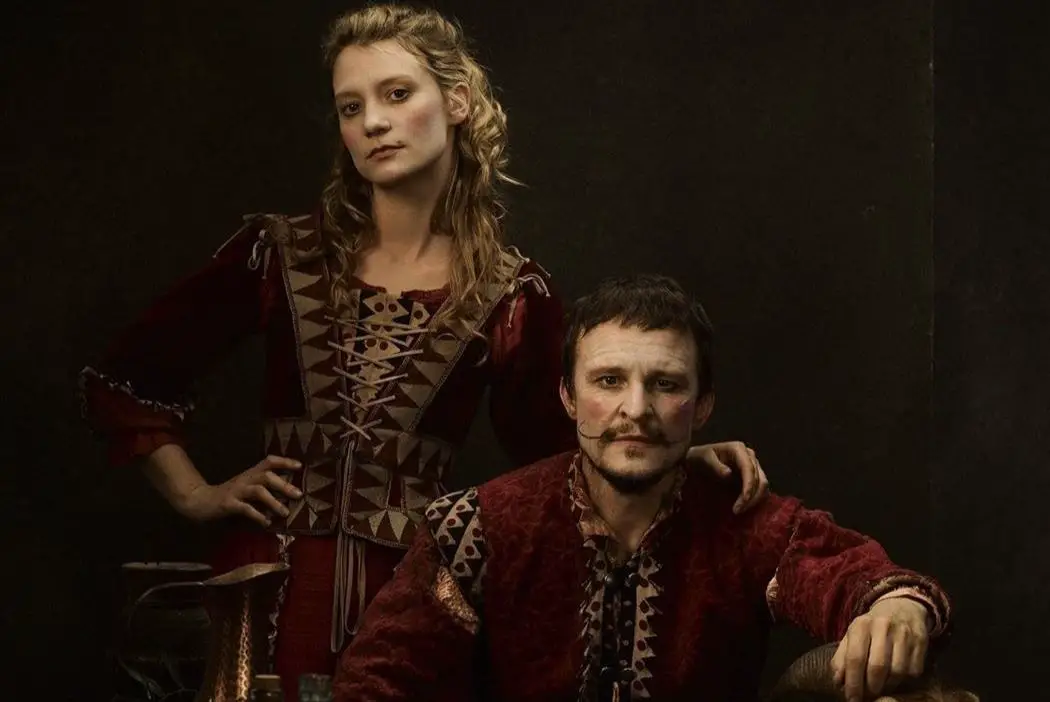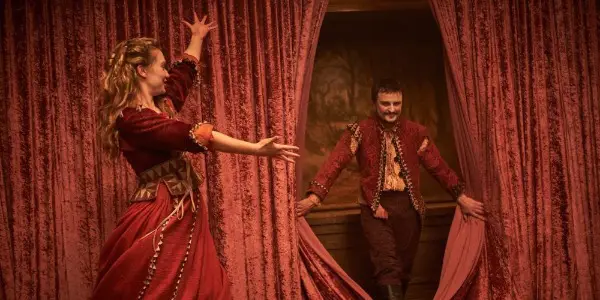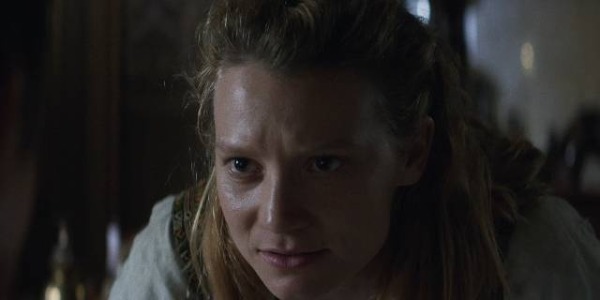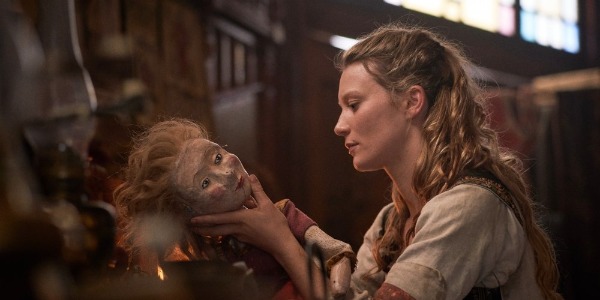JUDY & PUNCH: A Fitting Epilogue To A Decade’s Worth Of Gender Politics

I'm a film journalist and independent filmmaker who fell in…
With Judy & Punch, Mirrah Foulkes’s feature film debut has cemented the timelessness of the infamous “Punch & Judy” puppet show. Expanding on its lore, the film functions as a strange feminist parable; a fairy-tale western laced with political subtext and boasting a rather clever metafictional edge. Utilising the format’s low-brow roots to her advantage, Foulkes brings dimension and nuance to rather ancient customs, and places backwards-thinking and primitive male behaviour under the microscope of social justice.
Set in the town of Seaside, England, in the 17th century, married couple Judy (Mia Wasikowska) and Punch (Damon Herriman) run a marionette show out of a public house, where their puppets act out mindlessly violent shenanigans in order to pander to the lowest common denominator. While the more talented Judy remains humble and dedicated to her her craft, Punch excels as an attention-whore who reaps most of the credit. He is a reckless womaniser who drinks his days away and contributes to the more aggressive side of the husband-wife dynamic (on-stage and behind the scenes).
Judy tries to see goodness in the otherwise abusive Punch, and tries to get him to focus on taking care of their baby and laying off the booze. After Punch commits a most unforgivable sin, Judy finds no alternative but to force him to own up to his crime.
Punchy Themes
The timing of the film’s release could not be more appropriate, with Todd Phillips’s Joker embracing similarly anarchic themes of corruption, iconography, injustice and theatrical statements, in an ignorant and unforgiving society. Both films emphasise the ignorant and toxic nature of mob mentality and their poor judgement in playing the blame game and determining the real victim.

In Judy & Punch, the legal system is just as abused as the women that are executed. Paranoia-induced sexism and male oppression lead to witch hunts, with women being stoned to death after being accused of sorcery. The seemingly innocent Constable Derrick (Benedict Hardie) tries his best to uphold law and order in Seaside (while also being infatuated with Judy), but finds his authority constantly undermined and due process diminished in favour of a kangaroo court.
The #MeToo movement undoubtedly (and understandably) filled those who were abused with feelings of vengeance. Foulkes doesn’t try to quench the victims’ thirst but instead brings a sense of reason and strategy to the equation. Judy, the film’s moral compass, finds herself associating with a group of outcasts living out in the forest in secrecy, which leads to her cultivating strength through kindness, patience and understanding. It is for that reason alone that Judy & Punch has more in common with Taxi Driver than does the misguided Joker (Todd Phillips named the Scorsese classic as a key influence), which was hellbent on its single-minded vision of a bleak Gotham City.
The Writing
As a reinterpretation of the classic show, Foulkes’s ingenuity ensures that the various characters, creatures and tropes that long existed in the long-running format, would take on a new form, identity, omen or symbol in the story. As a narrative, it almost plays like your standard revenge story, until one realises that it it is the origins of a new mythology, added with satire.

Foulkes treats it as a piece of theatre, providing a suitable forum for woke culture to challenge and directly confront male chauvinism, without needing to embrace political correctness. If anything, it illustrates the preposterous, sheepish nature of social media users and their penchant for condemning and shaming those who may or may not deserve it. Even when set in more ancient times, Judy’s plight addresses that of the women of the 2010s.
The film exhibits a free spirit and exists in its own colourfully manic world, and gleefully plays with tone much in the same way that Stanley Kubrick did with the wild A Clockwork Orange. Our sense of humanity is put to the test when the film’s inciting incident blurs the line between comedy and tragedy, and we are placed in the same situation as those who first heard Ricky Gervais’s “dead baby” jokes. Somehow, the cartoonish antics and slapstick comedy manage to go hand in hand with the film’s more dramatic and spiritual elements.
The film does lack subtlety, however, and the vast majority of its characters are reduced to bizarre caricatures. When a character comes in during the first act and mocks progressive declarations like “Stop stoning women!”, you know the film is going to be on the nose about its message. The reason why it works better than other films is down to its carnivalesque portrait, and doesn’t shy away from expressionism.

Perhaps it is simply Foulkes’s way of transforming the last decade into a Greek tragedy, where the endless strife between feminism and male chauvinism is perfectly encapsulated by the conflicting titular characters. Punch knows when he is in the wrong, but will not admit he is in the wrong and tries to bury his faults beneath his “celebrity” persona (sound familiar?). Judy is the one who doesn’t recognise her the power of her real voice until she has reached the limit of male oppression.
It’s the little touches of sensitivity and vulnerability that make this otherwise storybook rendition just a little more poignant.
Acting & Style
While we aren’t overwhelmed with the dialogue, the film thrives on some of the quieter scenes, like the surreal moment where Judy eyes a crocodile in the lake, beautifully photographed by cinematographer Stefan Duscio (who brought wit and finesse to the fight scenes in 2018’s Upgrade). The masterful sound design and sharp editing effectively create a sense of doom and gloom to complement the gritty and grimy production design, giving Seaside its lived-in look. Francois Tetaz’s synthesised score gets under your skin and tips it hat in the way of Wendy Carlos, with electronic iterations of classical music that feel otherworldly.
While the various cast members offer a medley of emotions (with some warranting our sympathy and others inciting rage), it is down to Wasikowska and Herriman, who ground the film’s whimsical reality, and complete each other like a yin to a yang. Wasikowska is a strong presence whether by exhibiting her internal conflict or by demonstrating her female fury. Herriman plays Punch like a man battling split personality, with him genuinely wanting to do the right thing but finds himself at the mercy of his own image in the eyes of others.
While far from perfect, Judy & Punch has the strength of its convictions and is evidence of Mirrah Foulkes’s talent as a visual storyteller.
Judy and Punch was released in the U.K. and Ireland on November 22nd, 2019. For all international releases, click here.
Does content like this matter to you?
Become a Member and support film journalism. Unlock access to all of Film Inquiry`s great articles. Join a community of like-minded readers who are passionate about cinema - get access to our private members Network, give back to independent filmmakers, and more.
I'm a film journalist and independent filmmaker who fell in love with cinema at a young age. I also love writing about comics, literature, podcasts, television and video games. I'm just as content watching a movie about a giant killer pig terrorising the Australian outback as I am with one that features a catholic priest in crisis.












